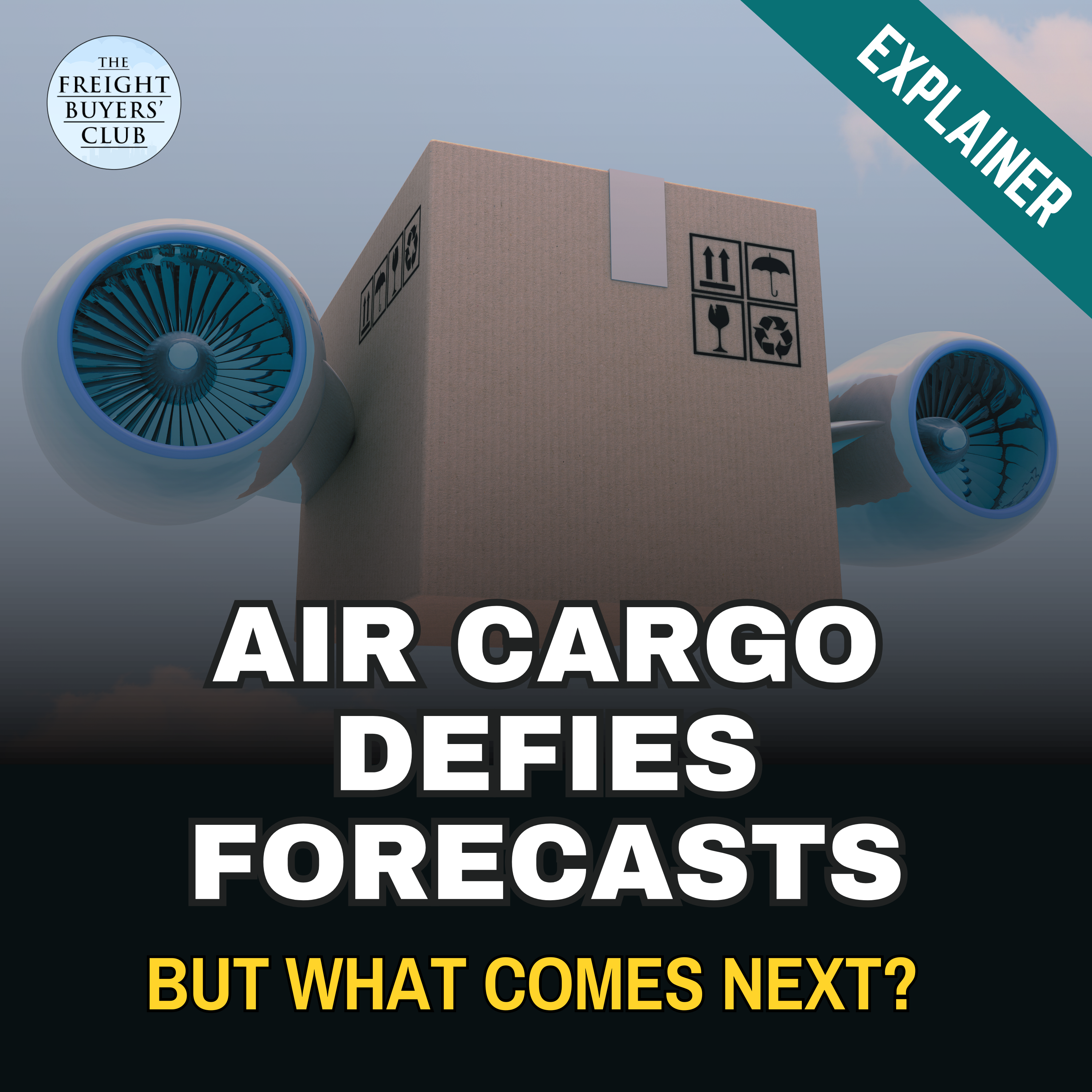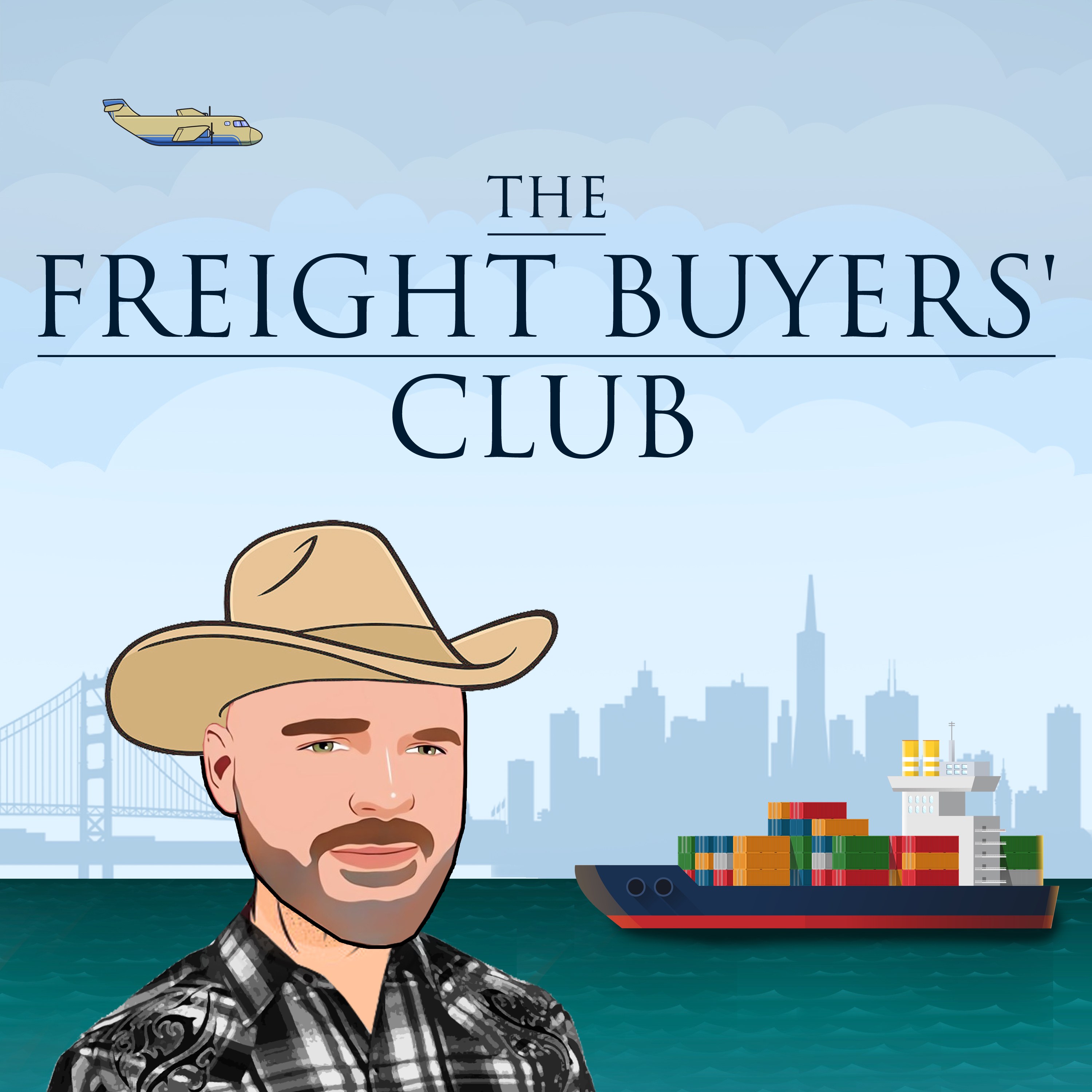Episode Transcript
[00:00:03] Speaker A: Hello and welcome to the Freight Buyers Club. I'm Mike King and this conversation is supported by Ontigos cloud experts in freight forwarder profitability.
Sustainable Logistics it's not going away with major decisions on the horizon, including new IMO rules on fuel emissions for container shipping. The way global supply chains decarbonize is becoming a critical issue for shippers and retailers.
I popped up to Sustainable Logistics Live in London at the end of September where spoke with John Trenchard, Vice President for sustainable International Supply Chains at DP World. John had just taken part in a panel on intermodal pathways to lower carbon logistics. Just a bit of background. DP World has been working to make London Gateway one of the lowest carbon ports in the world. And John has been central to running a lot of these trials for DP World at the Port of Southampton. I started by asking him if he could explain DP World's carbon inset and low carbon truck programs, what they are and how they help shippers and their transport partners cut emissions and then what comes next.
[00:01:09] Speaker B: It's really important that we offer lower carbon solutions for our customers. So at DP World in the uk, we operate two ports, London Gateway and Southampton, both capable of handling the world's most efficient shipping lines, vessels which are those very, very big, exciting 24,000 TE vessels which are very efficient. Now, in terms of the low carbon truck program and the carbon inset program, these are new, innovative solutions which we're offering to our customers on the carbon inset program. What this basically works is that every single import container that comes into the ports that DP will run in the UK earn 250 kilos of carbon inset credits, whether you like it or not. And basically customers can register to receive those carbon inset credits and those carbon inset credits can be used to address their scope. 3 Carbon emissions for the hard to abate supply chain emissions which are involved in those shipments, we create those credits by putting incrementally lower carbon fuel into container ships operated by Unifida operating in North Europe. And the reason why we've chosen 250 kilos as an appropriate level is that that's approximately equal to the emissions from the vessel coming from the pilot station navigating to the port, including the tugs alongside during operations and the navigation and tug are on the exit. We've had them validated with the University of Plymouth Maritime Transport Group to see that these are appropriate levels. And that's the reason why we've gone for that level.
And then on the. Sorry, that was the Carbon inset program and then for the low carbon truck program.
Often the truckers are an area which is not necessarily looked after. So we've got 4,500 truck visits every day happening at the port at Southampton and London Gateway. So what we are launching from the 1st of January is that for any trucker who brings their truck into our port more than 90 times in a 90 day period, three month period, which is approximately once a day, we will give them 5,000 liters, up to 5,000 liters of HVO, which is hydro treated vegetable oil, which has got up to 85% lower carbon than regular diesel. We will give that per quarter for the price of diesel.
So the idea here is that we've got something like 500 trucks which qualify for this. So it's quite a big proportion of the UK container fleet and they will be able to experiment with lower carbon fuel and look to see if they can actually use that towards their customers, the freight forwarders and the beneficial cargo owners in the UK market. And by the way, if you send your shipments through Southampton, London Gateway and you use a trucker who's on this scheme, you got the opportunity to having up to 85% less carbon for your container deliveries.
[00:04:04] Speaker A: I'm just taking that on a step, John, because obviously this is quite important. What are you doing to take that next step to getting freight off the road and on to rail, which is obviously one of the key sustainability supply chain aims.
[00:04:18] Speaker B: Yep. So Basically back in September 2023 we launched the modal shift program only in Southampton, but we wanted to trial how that works. So basically how that works is we are charging a modal shift fee of 10 pounds per container that gets applied to all import containers that come across the quay at Southampton. And if your container goes out by rail within a radius of 140 miles of the port, that container automatically gets credited a 70 pound, which is approximately $100 credit to go towards that shipment. Since we've launched that, we've seen the percentage of rail go from 21% to in some months over 30%. But on average 29%. We've moved 120,000 containers incrementally from pure road to road rail combinations. We've taken over 32,000 tonnes of CO2 out of the supply chain. By using this more efficiently and importantly, Mike, we've taken over 10 million truck miles off of the UK congested road network on the A34, the M27, the M271. Just to give some context for this, if a truck is delivering a container from Southampton to Birmingham, it's about 550 kilos of CO2 for a round trip to deliver that. If you use rail and then use the road for the local delivery, including the empty coming back again, that's about 250 kilos of CO2 less. So, in summary, for every single container that we can move from road to railroad combination, we save quarter of a ton of CO2, and that's importing increasingly for our customers.
[00:06:02] Speaker A: All very impressive, John, Just if I can give you a practical example, say for a cargo owner moving a typical container or a retailer shipping several boxes a week, how do these rail incentives, these insects and this HBO parity, how does that actually translate into emissions saved and real cost impact?
[00:06:23] Speaker B: Okay, so if you take a shipment, for example, from India and it's shipped into the UK, the sea freight emissions from that will be approximately 2 tons of CO2. If that container is then being delivered to Birmingham, which is in the center of the UK, that's another, as we discussed, 550 kilos, so about two and a half tonnes of carbon. So if you're on the carbon inset program, you save a quarter of a tonne. If you're on the modal shift program, you could save another quarter of a ton. So you're talking about a half a ton of the two and a half tonnes. So 20% savings, not in the future, not by changing molecules and looking at how hydrogen can be stored, but just by making choices and utilizing the assets that we've got in the UK economy today.
[00:07:11] Speaker A: Just to pan out slightly, John, are these schemes something you plan to roll out globally or is this UK just for now?
[00:07:19] Speaker B: Initially, we did trials in the UK because we needed to see how it works. We need to have the agility to be able to listen to our customers and fine tune. And often we have had to fine tune our approaches as we learn what's pragmatic in the market. But in the long run, we are always looking to see how we can expand our options across many different markets for our customers. And we're looking to see in future how we can perhaps use new markets with these learnings.
[00:07:44] Speaker A: If you had one message for a retailer's procurement team today, what the single action they should take with DP World or DP World uk or with any of their other providers to get the best verified carbon reduction in their supply chain.
[00:07:59] Speaker B: Okay, so what I would say is that there's a lot of energy put into measuring carbon and it's very, very important that we understand what it is, because if you can't measure it, you can't manage it. What I would encourage people to do is to start thinking about leaning in and trying some of these options which are available in the market. What can we do tomorrow that we didn't do today that moves the needle in the right direction? And I would suggest try some of these trials, be a bit brave and let's see if we can learn together and make the world a slightly better place than it is today.
[00:08:32] Speaker A: Thanks again to John Trenchard, Vice President for Sustainable International Supply Chains at DP World. It was a pleasure to join him at Sustainable Logistics Live. This interview was so supported by Ontegos cloud experts in freight forwarder profitability. I'm Mike King and this has been the Freight Buyers Club. For more conversations like this, please find us on www.the freightbuyersclub.com or you can also reach out to us via YouTube. We're on video on Spotify. Or you can find us on your podcast platform of choice. Until next time, thanks for watching.
[00:09:09] Speaker B: Sam.


